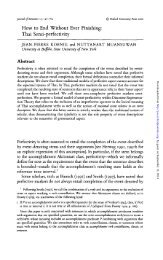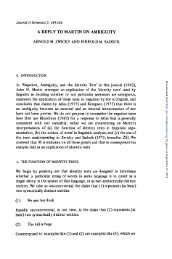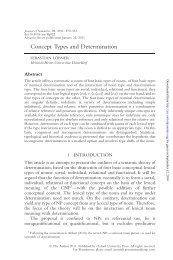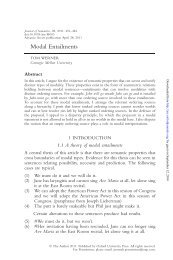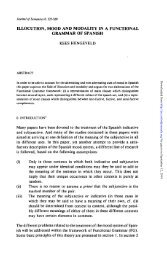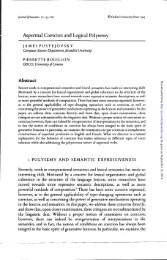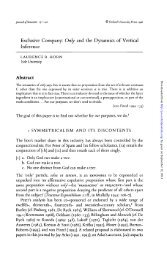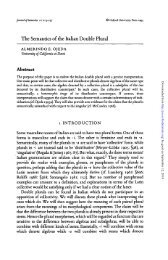Lexical Pragmatics - Journal of Semantics
Lexical Pragmatics - Journal of Semantics
Lexical Pragmatics - Journal of Semantics
Create successful ePaper yourself
Turn your PDF publications into a flip-book with our unique Google optimized e-Paper software.
Reinhard Blutner 147there is an update in each case when the starting clause sem(a) is consistentwith eg. The present account, on the other hand, yields a much morerestricted notion <strong>of</strong> update. There is a pragmatically licensed update onlywhen one <strong>of</strong> the cost-minimal abduced variants is consistent with eg. If allcost-minimal variants are inconsistent with eg they can be seen as 'blocking'any interpretation <strong>of</strong> the starting clause. As shown in the next section, thisdevice is appropriate to capture cases <strong>of</strong> pragmatic anomalies in naturallanguage interpretation.From a computational point <strong>of</strong> view, the present approach looks well if itis assumed that the abductive machine generates the abductive variants inthe order <strong>of</strong> its (estimated) costs. In this case, we have to assume simply thatthe abductive system stops if it has completed its first abductive pro<strong>of</strong>. Theresult is then given to the consistency checker. If the result is consistent, thesystem has found an interpretation. If not, the system may indicate that itdoesn't understand—the only interpretation it can find is a faulty one.Perhaps, there is a mechanism <strong>of</strong> accommodating the knowledge base thatrestores interpretability after all, but even then there is no possibility toaccess other variants than the cost-minimal ones.The overall architecture <strong>of</strong> the Hobbs-Stickel account sets out to accessnon-minimal variants when the minimal ones do not provide explanations.This feature makes processing less efficient, and it makes it difficult todiscriminate between 'good' and 'bad' interpretations. In contrast, thepresent view <strong>of</strong> interpretation connects an efficient processing architecturewith the possibility <strong>of</strong> providing an explanation <strong>of</strong> pragmatic anomalies.Straightforwardly, this way <strong>of</strong> realizing efficient processing conforms withthe realization <strong>of</strong> the monotonicity property <strong>of</strong> language processing (e.g.Alshawi & Crouch 1992; cf. section 2.2), and it is this idea that helps us toexplain pragmatic anomaly.There is yet another important feature distinguishing the presentaccount from the Hobbs-Stickel approach, the possibility <strong>of</strong> having noncancellableimplicatures. Let us call a conversational implicature <strong>of</strong> anutterance a in eg contextually cancellable iff there is a strengthening eg' <strong>of</strong> egsuch that a is interpretable in eg' but is not longer a conversationalimplicature <strong>of</strong> a in eg'.Obviously, the entailment eg U {sem(a)} f= excludes the contextualcancellability <strong>of</strong>



